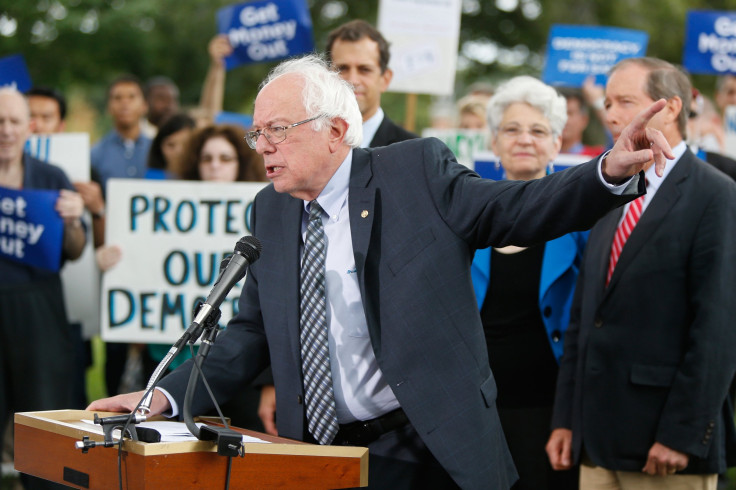Capping Spending Makes Elections More Competitive, Study Says

Campaign finance reformers may be on to something. Capping campaign spending may lead to a higher number of people running for office, candidates who are less wealthy on average and smaller advantages for incumbent officials, according to a paper published in the National Bureau of Economic Research this week.
Based on post-reform Brazilian mayoral election data, the study, from researchers based in California and Rio de Janeiro, found that a 25 percent drop in limits on campaign spending led to a 9 percent rise in the number of individuals running for office, as well as a 40 percent decrease in the average candidate’s wealth. Incumbents were 11 percent less likely to be put back in office — a “sizable effect,” the researchers noted, given that the “baseline” reelection rate was 23 percent.
Read: Who is Duncan Hunter? DOJ Investigating GOP Congressman For Campaign Finance Violations
If it were possible to replicate the study in the U.S., the results would’ve likely been magnified, given the rampant corruption investigations underway in Brazil, said Frederico Finan, an associate professor in the University of California, Berkeley’s economics department and one of the study’s authors.
“I’m hesitant to extrapolate the findings from Brazil, given the political turmoil going on there,” he said, citing the intense scrutiny on Brazil’s political figures during the country’s October 2016 elections, the period from which the paper pulls its data. But if the U.S. adopted campaign spending caps like the Brazilian ones at the center of his research, he added, “I think it would be actually more effective. I think the results would be even stronger.”
In the wake of Brazil’s Lava Jato scandal, a corruption investigation implicating members of the impeached President Dilma Rousseff’s Workers’ Party and former private employer, the country’s congress passed a law in September 2015. The new regulations stipulated that mayoral candidates could spend only 100,000 reals, equal to just over $30,000, on their campaigns, or 70 percent of the highest amount spent during the last campaign. Put simply, those for whom 70 percent of the last campaign’s spending equaled less than $30,000 could spend up to that much; the candidates whose predecessors spent more could spend more.
While most campaign finance laws are uniform country-wide, rendering controlled comparisons all but impossible, Brazil’s change in policy allowed the researchers to examine both districts that were only permitted to spend up to a cap of the equivalent of $30,000 versus those in municipalities where 70 percent of the previous campaign expenditure came to more than $30,000. Taking inflation adjustments into account, the researchers calculated that the new campaign finance law “created a discontinuous kink in the campaign spending limits of about 25 percent,” and were able to observe the resulting differences in outcomes.
Given the results of his team’s work, Finan advocated for strictly public financing of campaigns and limits on the incumbent advantage that “induces enrichment” and “reduces political accountability,” as well as the overturning of the 2010 Citizens United Supreme Court decision, which characterized political expenditures by corporations as exercises in free speech. He also expressed his support for government allotment of campaign ad airtime, a practice already underway in Brazil.
“In Brazil, candidates can’t spend on television advertising,” Finan said. “It gives every party time to give its platform.”
Read: Gov. Malloy Slashes Watchdog Budgets Amid Ethics and Campaign Finance Investigations
Campaign Legal Center General Counsel and Senior Director of Ethics Larry Noble, after reading the results of the study, echoed Finan’s calls for public financing of campaigns, and pointed to recent efforts to do so in localities and states throughout the U.S., such as Seattle and Connecticut. The federal government began administering public funding for presidential primary and general election campaigns in 1976, he said, and will match up to $250 of individual contributions to candidates. But, Noble said, that form of support essentially became irrelevant during former President Barack Obama’s first campaign, as the funding amounts have waned in comparison to ballooning private expenditures. But an embrace of public campaign financing, he added, helps to stymie the incumbent’s advantage, as well as the influence of “special interests.”
As for caps on spending, the problem rests with the Supreme Court, Noble said. When SCOTUS shot down a decades-old limit on party and campaign donations in the 2014 decision on McCutcheon v. Federal Election Commission, the ruling was framed as restricting any attempt to cap campaign funding to cases of corruption, rather than leveling the playing field.
“If you’re not individually wealthy or don’t have the connections, you’re not going to run,” Noble said. “Running for office is expensive... It basically becomes a fundraising arms race, and if you can’t afford it, you won’t run.”
© Copyright IBTimes 2024. All rights reserved.






















